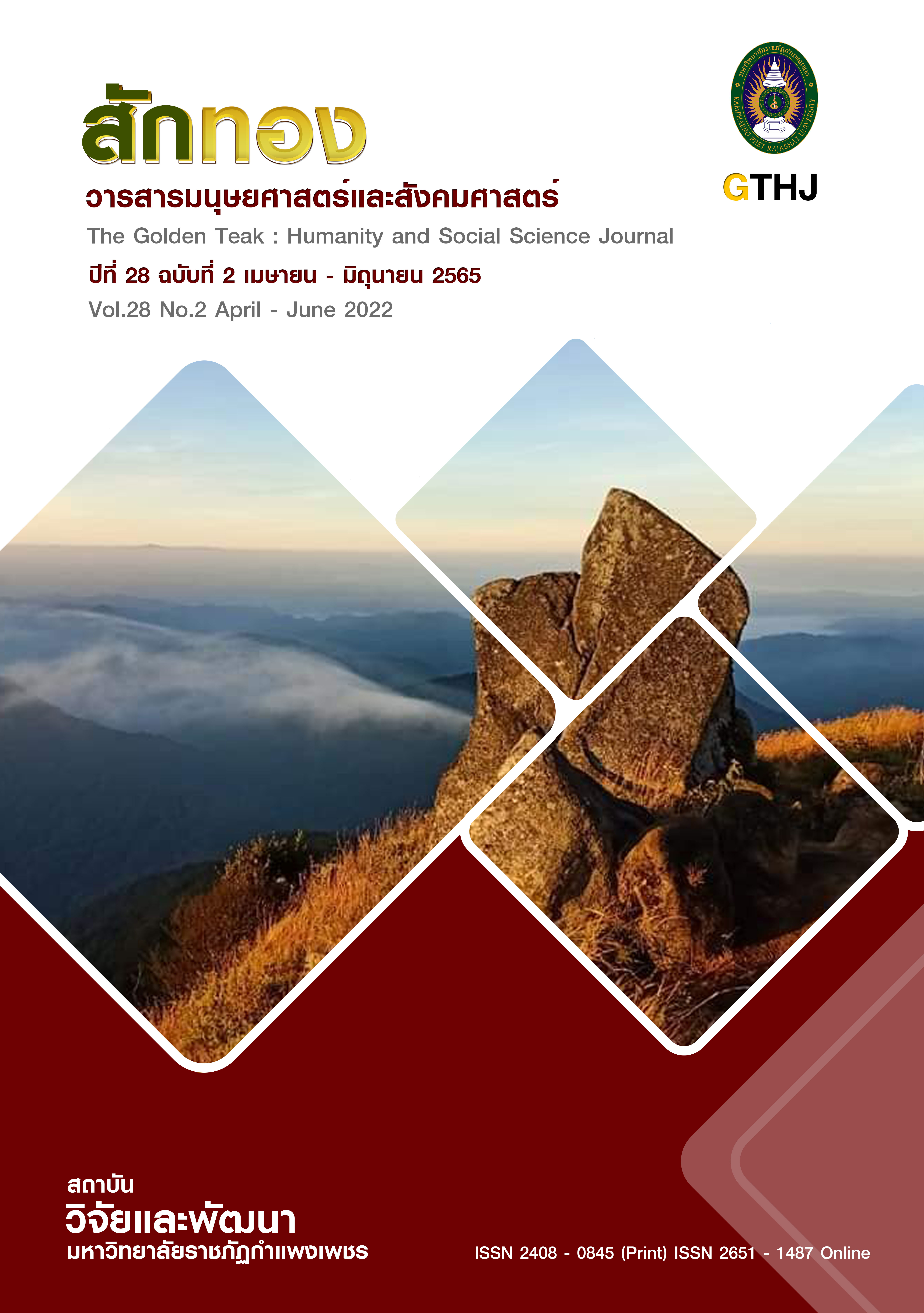The Development of English for Communication of Railway Station Personnel in the Rush Hour at Ayutthaya Station
Main Article Content
Abstract
The purposes of this research were 1) to study and analyze fundamental data for English for communication in rush hour at Ayutthaya station and 2) to develop of the English handbook for communication in rush hour and 3) to implement the English handbook for communication in rush hour. This research was mixed methods: research & development and qualitative research. The key informants were 32 peoples involved in English communication with international passengers who were mainly tourists. The research instruments used for data collection were participation observation, observe schedule, in-depth interview and English handbook. The content analysis was used to analyze the qualitative data. The results were as follows.
- The fundamental data investigation revealed that most international passengers were not from England and America but from Asian and some European countries. There were usually a big crowd of passengers before 10-15 minutes earlier than arrival time, causing rush hour at station. The causes of poor communication were sometimes the station announcer voicers and a loud noise. Learners needed English handbooks for communication in rush hour.
- The developed English handbook was consisted of easy and short conversational expressions, body language, visual and voice inflections.
- The outcome of the experiment revealed that learners could communicate with international passengers faster. There were not any communication problems at the station.
Article Details

This work is licensed under a Creative Commons Attribution-NonCommercial-NoDerivatives 4.0 International License.
บทความที่ได้รับการตีพิมพ์เป็นลิขสิทธิ์ของวารสาร สักทอง : วารสารมนุษยศาสตร์และสังคมศาสตร์ สถาบันวิจัยและพัฒนา มหาวิทยาลับราชภัฏกำแพงเพชร
ข้อคิดเห็นใดๆ ที่ปรากฎในวารสารเป็นวรรณกรรมของผู้เขียนโดยเฉพาะ ซึ่งมหาวิทยาลัยราชภัฏกำแพงเพชรและบรรณาธิการไม่จำเป็นต้องเห็นด้วย
References
Ambele, E.A. & Boonsuk, Y. (2020). Voices of Learners in Thai ELT Classrooms: A Wake up Call towards Teaching English as a Lingua Franca, Asian Englishes, 23(2), 1-17.
Asakereh, A., Yousuofi, N. & Weisi, H. (2019). Critical Content Analysis of English Textbooks Used in the Iranian Education System: Focusing on ELF features. Issues in Educational Research, 29(4), 1016-1038.
Bayyurt, Y., Kurt, Y., Öztekin, E., Guerra, L., Cavalheiro, L. & Pereira, R. (2019). English Language Teachers’ Awareness of English as a Lingua Franca in Multilingual and Multicultural Contexts. Eurasian Journal of Applied Linguistics, 5(2), 185-202.
Boonsuk, Y., Ambele, E.A. & Buddharat, C. (2018). Reconsidering the Practical Aspects of ELF in Thai ELT Classroom. Journal of Human Sciences, 19(1), 93-121.
Ellis, M. & Johnson, C. (1994). Teaching Business English. New York : Oxford University Press.
Inkaew, M. (2018). An Exploration of English as a Lingua Franca Communication: A Case Study of How English Is Used as a Lingua Franca among Non-native Speakers for Mutual Understanding in an International Golf Tournament Operation in Thailand. rEFLections, 25(2), 42-58.
Jenkins, J. (2009). English as a Lingua Franca: Interpretations and Attitudes. World Englishes, 28(2), 200-201.
Kakham, T. (2018). The Development of English Communication Skills in Tourism for Thonburi Area Community, Bangkok. Journal of Information, 17(2), 61-70.
Kanchananimmarn, T., Choocharoengrat, V. & Puwaset, P. (2020). Retail Communication and Service. Bangkok : All book.
Karakas, A. (2019). An Analysis of the High School English Curriculum in Turkey from an ELF Perspective.
I-Manager’s Journal on English Language Teaching, 9(2), 1-10.
Ministry of Tourism & Sports. (2021). Tourism statistics 2020. [Online]. Available : https://www.mots.go.th/News-link.php?nid=13174 [2021, September 18].
Office of the National Economic and Social Development Council. (2021). The Twelfth National Economic and Social Development Plan (2017-2021). [Online]. Available : https://www.nesdc.go.th/ewt_w3c/more_news.php?cid=230&filename=index [2021, September 18].
Office of the Permanent Secretary, Tourism & Sports. (2021). Tourism Economic Review. [Online]. Available : https://www.mots.go.th/download/TourismEconomicReport/4-1TourismEconomicVol4. pdf [2021, September 18].
Office of Transport and Traffic Policy and Planning. (2021). Project Studies: Transit Oriented Development (TOD) Ayutthaya. [Online]. Available : http://www.thailandtod.com/files/Ayutthaya/250762/1.pdf [2021, September 18].
Onkao, J. (2019). The Development of Learning Media for English Communication in Real-Life Situations for the Tourist Police in Ayutthaya Historical Park. RMUTSB Academic Journal Humanities and Social Sciences, 4(2). 240-241.
Phengkona, J., Na Thongkaew, B., Raksapol, A., Jittapraphan, B. & Popthawee, T. (2017). Curriculum Development in English Communication Course for Community Based Tourism. Journal of Research for Regional Development, 9(1). 38-51.
Promwatcharanon, K. & Chatreepinyo, P. (2018). An Analysis of Challenges and Requirements of Using Communicative English for Developing a Self-Access Learning Package for Traffic Police Officers in Upper Northern Thailand. Humanities & Social Sciences. 35(1). 163-195.
Puapunpongse, K. (2017). Challenge of Policy Implementation: A Case study of High Speed Rail Project for Bangkok-Nakhon Ratchasima Route, Under the Cooperation of Thai and Chinese Governments. Master’s Thesis Public Administration and Public Affairs, Thammasat University.
Solhi, M., Mert, Y. Z., Çelen, Z. & Kısa, R. (2021). Evaluating the Long-term Effectiveness of English Language Coursebooks at Turkish Public High Schools. Eurasian Journal of Applied Linguistics, 7(1), 458-483.
Suwannaprut, T. & Siriwan, A. (2019). Communication Strategies Used by VRU Students Enrolled in Listening and Speaking Strategies for Learners of English as a Foreign Language. Valaya Alongkorn Review (Humanities and Social Science), 9(3), 140-156.
Tourism Authority of Thailand. (2021). Annual report. [Online]. Available : https://www.tat.or.th/th/about-tat/annual-report [2021, September 18].
Treesakul, P. (2008). Principles of Communication Arts. (6 th ed.). Bangkok : Suan Sunandha Rajabhat University.


